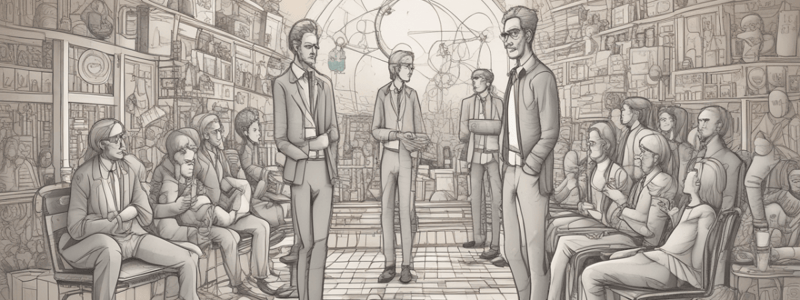Podcast
Questions and Answers
Define formal organizations and provide two examples.
Define formal organizations and provide two examples.
Formal organizations are structured entities such as governments, businesses, and universities.
How do informal organizations develop within formal organizations?
How do informal organizations develop within formal organizations?
Informal organizations develop from patterns of social relations that form naturally among members of the organization.
Describe a scenario that could be considered part of an informal organization within a formal organization.
Describe a scenario that could be considered part of an informal organization within a formal organization.
A group of co-workers regularly eating lunch together or going to the gym together.
Explain how social organizations differ from formal organizations.
Explain how social organizations differ from formal organizations.
Signup and view all the answers
Can informal organizations exist within social organizations? Why or why not?
Can informal organizations exist within social organizations? Why or why not?
Signup and view all the answers
Why might an individual leave a group if it restricts their personal freedom?
Why might an individual leave a group if it restricts their personal freedom?
Signup and view all the answers
What demands might cause members to leave a group?
What demands might cause members to leave a group?
Signup and view all the answers
What are the three options members have when they disapprove of a group's position or policies?
What are the three options members have when they disapprove of a group's position or policies?
Signup and view all the answers
Why might people leave a group if it no longer reflects their basic values and beliefs?
Why might people leave a group if it no longer reflects their basic values and beliefs?
Signup and view all the answers
What might lead individuals to resign when the ideology that attracted them to the group no longer exists?
What might lead individuals to resign when the ideology that attracted them to the group no longer exists?
Signup and view all the answers
How does being part of an academic or research team benefit an individual?
How does being part of an academic or research team benefit an individual?
Signup and view all the answers
In what way does acceptance into highly prestigious groups impact an individual's self-esteem?
In what way does acceptance into highly prestigious groups impact an individual's self-esteem?
Signup and view all the answers
What are some material benefits people might receive from being in a group?
What are some material benefits people might receive from being in a group?
Signup and view all the answers
How can group membership be financially beneficial?
How can group membership be financially beneficial?
Signup and view all the answers
In what ways is culture transmitted within groups?
In what ways is culture transmitted within groups?
Signup and view all the answers
What motivates some people to join groups based on the benefits related to life events?
What motivates some people to join groups based on the benefits related to life events?
Signup and view all the answers
Why is group membership central to our self-concept?
Why is group membership central to our self-concept?
Signup and view all the answers
How does belonging to a group help satisfy important psychological and social needs?
How does belonging to a group help satisfy important psychological and social needs?
Signup and view all the answers
Give an example of a task that a group can accomplish more easily than an individual.
Give an example of a task that a group can accomplish more easily than an individual.
Signup and view all the answers
What role does an army play in demonstrating the importance of groups?
What role does an army play in demonstrating the importance of groups?
Signup and view all the answers
Explain how group efforts can contribute to maintaining a city's cleanliness.
Explain how group efforts can contribute to maintaining a city's cleanliness.
Signup and view all the answers
In what ways does group membership provide self-knowledge?
In what ways does group membership provide self-knowledge?
Signup and view all the answers
Study Notes
Types of Organisations
- Formal organisations: governments, businesses, universities, and other structured entities
- Informal organisations: patterns of informal relations within a formal organisation, e.g. co-workers socialising together
- Social organisations: arise spontaneously, often for enjoyment, e.g. clubs, families, gangs
Why People Leave Groups
- Individuals may leave a group if it restricts their freedom
- Groups that demand too much time, energy, and resources may lead to members leaving
- Members may leave if they disapprove of the group's positions or policies
- Changes in a group's values or ideology can also lead to members leaving
Why People Join Groups
- To obtain knowledge, information, and skills not available otherwise
- To build self-esteem and boost status
- To obtain material and tangible benefits, such as donations or loans
- To transmit culture and pass on values, language, and ways of thinking
Benefits of Joining Groups
- Satisfy psychological and social needs, such as belonging or receiving attention
- Gain self-knowledge and define oneself through group membership
- Achieve goals that cannot be accomplished alone, such as completing tasks or accomplishing large-scale projects
Studying That Suits You
Use AI to generate personalized quizzes and flashcards to suit your learning preferences.
Description
Understand the different types of organisations, including formal, informal, and social organisations. Learn about the reasons why individuals may leave a group, including restrictions on freedom and excessive demands.



